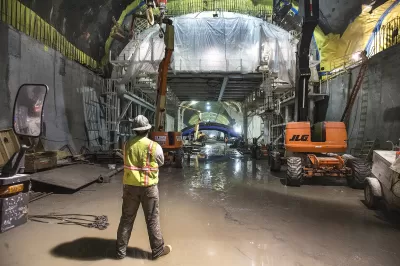Could the cancellation the New York Metropolitan Transportation Authority's membership in the American Public Transportation Association be the wakeup call the transit industry needs?

"The country’s largest transit agency is withdrawing from the country’s main transit trade association," according to an article on the TransitCenter website. The agency in question is the New York Metropolitan Transportation Authority (MTA), which accounted for 35 percent of all transit ridership in the United States. "The idea of a transit industry association that doesn’t include the MTA is akin to an OPEC without Saudi Arabia," adds the post.
"The essence of the MTA’s complaint is that APTA is not worth the investment. In the letter, officials noted the agency pays $400,000 per year because of its size but in return has little influence within the organization," according to the post.
The post goes into more detail, revealingly, about the discontent also surrounding the way transit is funded at the federal level, with some transit organizations happy to applaud the silver linings of policies like the FAST Act instead of fighting for fundamental reforms in transportation funding. "These issues were not likely root causes of the MTA’s decision to leave APTA. But the agency’s withdrawal nonetheless presents an opportunity to re-examine the way the conversation around public transportation has developed both in Washington and peer-to-peer within the industry."
FULL STORY: MTA Pulls The Plug On APTA

Planetizen Federal Action Tracker
A weekly monitor of how Trump’s orders and actions are impacting planners and planning in America.

Chicago’s Ghost Rails
Just beneath the surface of the modern city lie the remnants of its expansive early 20th-century streetcar system.

San Antonio and Austin are Fusing Into one Massive Megaregion
The region spanning the two central Texas cities is growing fast, posing challenges for local infrastructure and water supplies.

Since Zion's Shuttles Went Electric “The Smog is Gone”
Visitors to Zion National Park can enjoy the canyon via the nation’s first fully electric park shuttle system.

Trump Distributing DOT Safety Funds at 1/10 Rate of Biden
Funds for Safe Streets and other transportation safety and equity programs are being held up by administrative reviews and conflicts with the Trump administration’s priorities.

German Cities Subsidize Taxis for Women Amid Wave of Violence
Free or low-cost taxi rides can help women navigate cities more safely, but critics say the programs don't address the root causes of violence against women.
Urban Design for Planners 1: Software Tools
This six-course series explores essential urban design concepts using open source software and equips planners with the tools they need to participate fully in the urban design process.
Planning for Universal Design
Learn the tools for implementing Universal Design in planning regulations.
planning NEXT
Appalachian Highlands Housing Partners
Mpact (founded as Rail~Volution)
City of Camden Redevelopment Agency
City of Astoria
City of Portland
City of Laramie





























